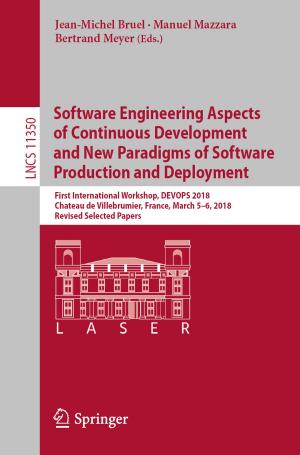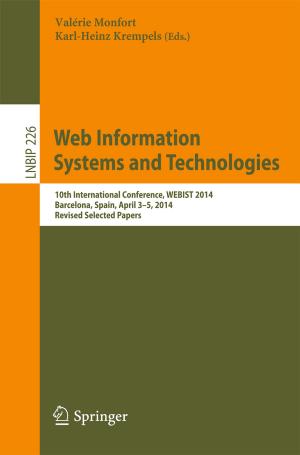Distributions, Partial Differential Equations, and Harmonic Analysis
Nonfiction, Science & Nature, Mathematics, Functional Analysis, Differential Equations| Author: | Dorina Mitrea | ISBN: | 9783030032968 |
| Publisher: | Springer International Publishing | Publication: | December 29, 2018 |
| Imprint: | Springer | Language: | English |
| Author: | Dorina Mitrea |
| ISBN: | 9783030032968 |
| Publisher: | Springer International Publishing |
| Publication: | December 29, 2018 |
| Imprint: | Springer |
| Language: | English |
The aim of this book is to offer, in a concise, rigorous, and largely self-contained manner, a rapid introduction to the theory of distributions and its applications to partial differential equations and harmonic analysis. The book is written in a format suitable for a graduate course spanning either over one-semester, when the focus is primarily on the foundational aspects, or over a two-semester period that allows for the proper amount of time to cover all intended applications as well. It presents a balanced treatment of the topics involved, and contains a large number of exercises (upwards of two hundred, more than half of which are accompanied by solutions), which have been carefully chosen to amplify the effect, and substantiate the power and scope, of the theory of distributions. Graduate students, professional mathematicians, and scientifically trained people with a wide spectrum of mathematical interests will find this book to be a useful resource and complete self-study guide. Throughout, a special effort has been made to develop the theory of distributions not as an abstract edifice but rather give the reader a chance to see the rationale behind various seemingly technical definitions, as well as the opportunity to apply the newly developed tools (in the natural build-up of the theory) to concrete problems in partial differential equations and harmonic analysis, at the earliest opportunity.
The main additions to the current, second edition, pertain to fundamental solutions (through the inclusion of the Helmholtz operator, the perturbed Dirac operator, and their iterations) and the theory of Sobolev spaces (built systematically from the ground up, exploiting natural connections with the Fourier Analysis developed earlier in the monograph).
The aim of this book is to offer, in a concise, rigorous, and largely self-contained manner, a rapid introduction to the theory of distributions and its applications to partial differential equations and harmonic analysis. The book is written in a format suitable for a graduate course spanning either over one-semester, when the focus is primarily on the foundational aspects, or over a two-semester period that allows for the proper amount of time to cover all intended applications as well. It presents a balanced treatment of the topics involved, and contains a large number of exercises (upwards of two hundred, more than half of which are accompanied by solutions), which have been carefully chosen to amplify the effect, and substantiate the power and scope, of the theory of distributions. Graduate students, professional mathematicians, and scientifically trained people with a wide spectrum of mathematical interests will find this book to be a useful resource and complete self-study guide. Throughout, a special effort has been made to develop the theory of distributions not as an abstract edifice but rather give the reader a chance to see the rationale behind various seemingly technical definitions, as well as the opportunity to apply the newly developed tools (in the natural build-up of the theory) to concrete problems in partial differential equations and harmonic analysis, at the earliest opportunity.
The main additions to the current, second edition, pertain to fundamental solutions (through the inclusion of the Helmholtz operator, the perturbed Dirac operator, and their iterations) and the theory of Sobolev spaces (built systematically from the ground up, exploiting natural connections with the Fourier Analysis developed earlier in the monograph).















